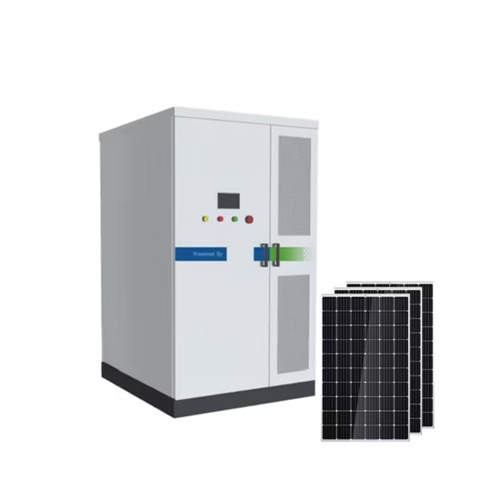Lithium battery energy storage integration technology

Residential Energy Storage Solutions with Lithium Batteries
4 天之前· The shift to sustainable energy sources is fundamentally changing how homeowners manage energy. With the rise of renewable energy, especially solar power, the need for

Executive summary – Batteries and Secure Energy
Lithium-ion batteries dominate both EV and storage applications, and chemistries can be adapted to mineral availability and price, demonstrated by the market share for lithium iron phosphate (LFP) batteries rising to 40% of EV sales and

Nanotechnology-Based Lithium-Ion Battery Energy
Nanotechnology-based Li-ion battery systems have emerged as an effective approach to efficient energy storage systems. Their advantages—longer lifecycle, rapid-charging capabilities, thermal stability,

Battery Energy Storage System (BESS): In-Depth
The investment required for a BESS is influenced by several factors, including its capacity, underlying technology (such as lithium-ion, lead-acid, flow batteries), expected operational lifespan, the scale of application

Battery Energy Storage System (BESS) | The Ultimate Guide
A BESS collects energy from renewable energy sources, such as wind and or solar panels or from the electricity network and stores the energy using battery storage technology. The batteries

Battery Energy Storage: How it works, and why it''s important
Explore how battery energy storage works, its role in today''s energy mix, and why it''s important for a sustainable future. Renewable Energy Integration. Lithium-ion technology is mature

Improvement in battery technologies as panacea for renewable energy
This review article explores the critical role of efficient energy storage solutions in off-grid renewable energy systems and discussed the inherent variability and intermittency of

Beyond lithium-ion: emerging frontiers in next-generation battery
1 Introduction. Lithium-ion batteries (LIBs) have been at the forefront of portable electronic devices and electric vehicles for decades, driving technological advancements that have

Lithium-Ion Battery
Not only are lithium-ion batteries widely used for consumer electronics and electric vehicles, but they also account for over 80% of the more than 190 gigawatt-hours (GWh) of battery energy storage deployed globally through

A Review on the Recent Advances in Battery Development and
For grid-scale energy storage applications including RES utility grid integration, low daily self-discharge rate, quick response time, and little environmental impact, Li-ion batteries are seen

Fault diagnosis technology overview for lithium‐ion battery energy
The IEC standard ''Secondary cells and batteries containing alkaline or other non-acid electrolytes—Safety requirements for secondary lithium cells and batteries, for use in

6 FAQs about [Lithium battery energy storage integration technology]
Are lithium-ion battery energy storage systems sustainable?
Presently, as the world advances rapidly towards achieving net-zero emissions, lithium-ion battery (LIB) energy storage systems (ESS) have emerged as a critical component in the transition away from fossil fuel-based energy generation, offering immense potential in achieving a sustainable environment.
Are Li-ion batteries better than electrochemical energy storage?
For grid-scale energy storage applications including RES utility grid integration, low daily self-discharge rate, quick response time, and little environmental impact, Li-ion batteries are seen as more competitive alternatives among electrochemical energy storage systems.
What is a battery energy storage system?
Battery energy storage systems (BESS) Electrochemical methods, primarily using batteries and capacitors, can store electrical energy. Batteries are considered to be well-established energy storage technologies that include notable characteristics such as high energy densities and elevated voltages .
Are lithium-ion batteries energy efficient?
Among several battery technologies, lithium-ion batteries (LIBs) exhibit high energy efficiency, long cycle life, and relatively high energy density. In this perspective, the properties of LIBs, including their operation mechanism, battery design and construction, and advantages and disadvantages, have been analyzed in detail.
What are thin-film lithium-ion batteries (LIBs)?
One of the current cutting-edge energy storage technologies is the use of thin-film lithium-ion batteries (LIBs) .
Can batteries be used in grid-level energy storage systems?
In the electrical energy transformation process, the grid-level energy storage system plays an essential role in balancing power generation and utilization. Batteries have considerable potential for application to grid-level energy storage systems because of their rapid response, modularization, and flexible installation.
Related Contents
- The core technology of lithium battery energy storage cabinet is
- Lithium battery energy storage technology service life
- Lithium battery won the bid for energy storage company
- What is the prospect of lithium battery energy storage
- Industrial energy storage lithium battery manufacturer
- Photovoltaic power generation and energy storage lithium battery assembly
- Declaration of lithium battery energy storage cabinet
- Retail price of energy storage lithium battery
- Lithium battery for emergency energy storage English
- 50kw lithium battery energy storage system inverter power supply
- Energy storage lithium battery protection board system
- Which photovoltaic lithium battery energy storage is better